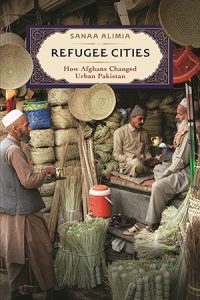Refugee Cities: How Afghans Changed Urban Pakistan

Author: Sanaa Alimia
Publisher: University of Pennsylvania Press
Year of Publication: 2022
Print Length: 248 pages
Genre: Non-Fiction / Social Science
Area: Pakistan
People: Afghan
Topic: City & Urban, Asylum & Refugee System, Asylum & Asylum Seekers, Refugees & Forced Migration, Protracted Refugee Situations, Refugee Urban Settlement, Refugee Economies, Refugee Local Integration, Refugee Repatriation, Deportation, Humanitarian Urbanism, Governance, Labor & Contract, Everyday Life, Testimonies, Lived Experience, History, Post 9/11, War on Terror, Geopolitics, Politics & Power, Imperialism, Colonialism & Post-Colonialism, Violence & Mass Violence, Poverty, Technology & Surveillance; Passport, ID, and Identification; Social Change, Change, Borders, Camps, Culture & Society, Identity, Water
Situated between the 1970s Soviet Union’s invasion of Afghanistan and the post–2001 War on Terror, Refugee Cities tells the story of how global wars affect everyday life for Afghans who have been living as refugees in Pakistan. This book provides a necessary glimpse of what ordinary life looks like for a long-term refugee population, beyond the headlines of war, terror, or helpless suffering. It also increases our understanding of how cities—rather than the nation—are important sites of identity-making for people of migrant origins.
In Refugee Cities, Sanaa Alimia reconstructs local microhistories to chronicle the lives of ordinary people living in low-income neighborhoods in Peshawar and Karachi and the ways in which they have transformed the cities of which they are a part. In Pakistan, formal citizenship is almost impossible for Afghans to access; despite this, Afghans have made new neighborhoods, expanded city boundaries, built cities through their labor in construction projects, and created new urban identities—and often they have done so alongside Pakistanis. Their struggles are a crucial, neglected dimension of Pakistan’s urban history. Yet given that the Afghan experience in Pakistan is profoundly shaped by geopolitics, the book also documents how, in the War-on-Terror era, many Afghans have been forced to leave Pakistan. This book, then, is also a documentation of the multiple displacements migrants are subject to and the increased normalization of deportation as a part of “refugee management.”
Table of Contents
List of Abbreviations
Preface
Introduction. Refugee Cities
PART I. BACKGROUND
1. Ghosts of Empire: The Afghan Question in Pakistan
PART II. CLAIMING RIGHTS
2. The Right to Water in an Informal Refugee Camp
3. Bulldozers and Violence in a Pakistani Settlement
4. Peshawar’s Afghan Transformation
PART III. PUSHING OUT AFGHANS
5. Surveillance, Documents, and Repatriation
Conclusion
Epilogue
Notes
Bibliography
Index
Acknowledgments

Sanaa Alimia is a political scientist with a focus on migration, surveillance, and urbanity. She holds a PhD from SOAS, London and an MSc from the LSE. Prior to joining the Aga Khan University, Institute for the Study of Muslim Civilisations (AKU-ISMC), she was a Research Fellow at the Leibniz Zentrum Moderner Orient, Berlin (2016-2019) and a recipient of the COFUND Dahlem Research Award, at the Freie Universität and Leibniz Zentrum Moderner Orient, Berlin (2014-2016). She was a Visiting Assistant Professor at the Department of Political Science, University of Peshawar (2013-2016) and a Senior Teaching Fellow at the Department of Politics and International Studies, SOAS (2011-2014).
Source: https://www.aku.edu/ismc/people/Pages/sanaa-alimia.aspx
More from Sanaa Alimia in this library, click here.
